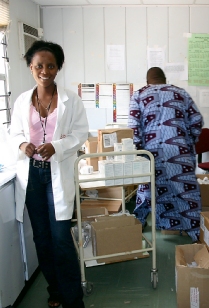Botswana: Experiences from the antiretroviral dispensary
During the work for my thesis for the degree Cand.pharm., I had the opportunity to spend five weeks at Princess Marina Hospital (PMH) Pharmacy in Botswana in 2006, to learn about treatment of HIV positive patients in a resource-constrained setting. Not only did I learn about prescribing guidelines and practices for antiretroviral therapy (ART), I also gained important insight in the challenges that the pharmacy staff face daily in their work due to the high patient load, lack of preferred formulation or dosage of the medication, and by dealing with many patients with poor knowledge of the disease and their medication.

Tekst: Karine Wabø Ruud, Ph.D student, School of Pharmacy, University of Oslo

The ART programme
The name of the national ART programme in Botswana is called MASA, and the programme is internationally well acknowledged. MASA was initiated in 2002, as the first public ART programme providing ART for free in sub-Saharan Africa. The programme started with only four sites, but by the end of 2006 there were 32 sites that provide a comprehensive antiretroviral (ARV) service including medical, laboratory, pharmacy and counselling. Every month about 10 000 patients come to Princess Marina Hospital Pharmacy for ARVs, 1300 of these are children. About 5000 patients have been transferred out of Princess Marina Hospital to other locations under a Public Private Partnership Initiative. The aim of this has been to relief some of the work load on PMH. About 13 pharmacists from the hospital pharmacy are involved in daily delivering of ARVs for HIV patients. All the pharmacists who work with the ART programme are required to have completed a standardised training programme for this particular work.
The Paediatric Clinic
I open the door to Baylor Centre of Excellence and I see mothers with their babies sitting side by side. It's 8 am and I walk across to the ARV dispensary which is preparing for new patients. All the shelves are filled with bottles of different ARV solutions and tablets, vitamin supplements and antibiotic prophylaxis for HIV positive children. A paper on the wall shows closing time 6.08 pm the previous day, which tells me a little bit about what the officers are facing as they are about to open the dispensary and start a new day's duty.
The pharmacist opens the window and gives sign for the first patient to come. A mother, with her son wearing his uniform and backpack ready for school, hands over a yellow plastic bag with what's left of medications from the previous visit. All the tablets are counted and the volume of solution in the bottles is estimated. The pharmacist takes good time to ask important questions such as if there's any medication left at home, how the medication is taken and if the mother can demonstrate with a syringe how many millilitres she gives in the morning and in the evening. The conversation proceeds in mixed English and Setswana, and the pharmacist makes sure to remind the mother about the next doctor appointment. The additional medication needed for the next 35 days is calculated according to daily dosage and recorded for stock balance before the bottles with handwritten labels are given out.
There is another lady sitting next to the first one, in her arms she's holding a baby. The pharmacy technician is asking if she has an electric fridge at home. Since the dosage of Didanosine (ddI) is prescribed as 125 mg twice daily and the dispensary only has 100 mg tablets or powder for suspension, it would be recommended to dispense the suspension and tell the lady how many millilitres she should give the baby. The mother answers that there's no such fridge, only a cool place in the house. This is an unfortunate, but not unusual situation. The officer must dispense ddI tablets 1¼ to be taken twice a day. Because of poor stability the ddI suspension must be kept in a fridge and can't be dispensed for this patient.
New patients come and go. One who comes with his child is 10 days late because of illness which kept them from travelling to the hospital. One has a daughter who is now old enoughto have her own opinion about how many different kinds of tablets she will take and how frequently she will accept to take them. The pharmacy technician is worried by the fact that the girl refuses to take the medication and considers to refer her to a counsellor. Most of the caretakers bring back too much medication compared to how much is expected to be left if adherence was optimal. The officers ask over and over again, always with the same kind and friendly approach «can you show me how you give this medicine, mam?» It's past lunch time and I wonder how they are able to keep up such a good attitude in spite of the constant challenges, knowing this is how the day will continue till after ideal closing hours. Maybe one of the things that motivates them is the fact that they can make a difference; seeing patients who appreciate their effort and experiencing that by communicating with the patients, tears or feelings of fear may be turned to new motivation for the patient.
Infectious Disease Care Clinic
Another morning I walk across the hospital area on my way to the pharmacy. It's Wednesday morning, just before 7.30 am. As I pass by Infectious Disease Care Clinic (IDCC) I can see that patients have already gathered outside the clinic. Knowing that it is Wednesday makes me feel sorry for the patients who are waiting since they can't expect the dispensary to open until past 9 am. There is a notice on the door written in both Setswana and English informing patients that every Wednesday morning, the pharmacy staff have their weekly meeting. Because of previous experiences, many patients still choose to come early even on this day. Considering that more than 500 HIV positive patients come to refill their ARV medication at this unit every day one can understand their wish to line up early.
There is a common understanding of how the queuing system works and the patients move from seat to seat closer to the dispensary desk. However, once in a while some of the patients start arguing about the order in the line, shouting out loud and waving their arms trying to justify their position in the line. The pharmacists do their very best to help everyone as fast and as much as they can, but this work is not always straight forward and it is an impossible task to prevent the long queues. The pharmacists must take time to monitor adherence, talk to the patients about problems they may experience and control the doctor's prescription. Especially in cases where the patient's card shows a reduced liver or renal function it is important to consider the dosage of each medication carefully. So I can only feel sorry for patients who, due to the challenging and heavy work load, must spend most of their day aiming for one thing; refill of the next month's medication.
At 1.30 pm one of the ladies starts crying. She has been waiting in line since 6.30 am the same morning, and when she reaches the front she is told that she has lined up at the wrong place and needs to go to a different place. This happens sometimes since they differentiate between patients who come for monthly refill only, and those who come after a doctor's appointment. I can almost feel her frustration and the impossibility of holding back her tears, knowing she's been waiting for six hours in the wrong line.
Another patient comes to the front and the pharmacist questions why there are so many tablets left in the bag (Efavirenz 200mg). The patient has no explanation, because he has taken one tablet a day just like the doctor told him to. The pharmacist asks why he has only been taking one tablet a day, when he's supposed to take three. Discussing adherence according to patient's self report and pill-count is one of the pharmacists' duties which they spend a lot of time doing. The patient doesn't understand and repeats that the doctor told him totake only one tablet daily, which he has done. The pharmacist takes a look at his card again and can see that the patient used to receive Efavirenz 600mg, but due to stock shortage lately they have been dispensing 200mg tablets and instructed that patients to take three tablets instead of one. As this situation shows, not only the patients own decision about how they wish to take their medication influence on the actual adherence. Both doctors and pharmacist communicate with patients directly, and are in position to enforce a high level of adherence. However, the way new information is presented to the patients may be of great importance and since many of the pharmacy staff are not Botswanan, they cannot always translate new instructions in a way that patients easily understand. To address problems with poor adherence, patients are offered counselling when lack of adherence is identified. Some of the pharmacists have been trained to participate in the counselling team.
The impression I'm left with after the weeks I spent at Princess Marina Hospital Pharmacy, is that the pharmacy staff is facing major challenges every day when it comes to supplying patients with the right medication and sufficient information. However, they keep a friendly attitude towards their patients, and work hard in order to provide reasonable services and solutions to their daily problems.
Out of consideration for the non-Norwegian speaking staff at Princess Marina Hospital Pharmacy, this article is printed in English.
(Publisert i NFT nr. 10/2007 side 24–25.)
